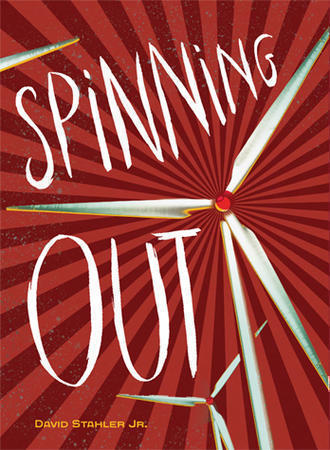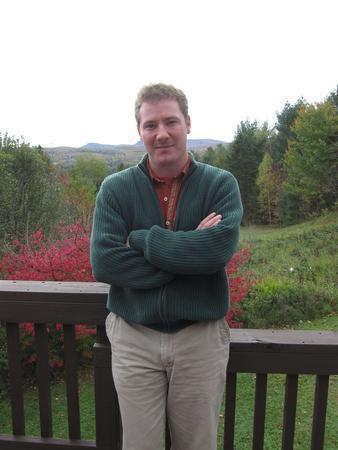 “Spinning out,” by David Stahler Jr. is the story of friendship between to teenagers — Frenchy and Stewart. The two decide to try out for the school musical, “The Man of la Mancha.” Surprisingly, the guys are really good, but when Stewart starts to act out his character outside of school, Frenchy worries that there’s something deeper going on. Below is a complete transcript of David’s email interview with Cracking the Cover.
“Spinning out,” by David Stahler Jr. is the story of friendship between to teenagers — Frenchy and Stewart. The two decide to try out for the school musical, “The Man of la Mancha.” Surprisingly, the guys are really good, but when Stewart starts to act out his character outside of school, Frenchy worries that there’s something deeper going on. Below is a complete transcript of David’s email interview with Cracking the Cover.
Background — Have you always wanted to write? Why?
I call myself the accidental novelist. I always enjoyed writing, took some creative writing courses as an undergrad at Middlebury College, but love teaching and was pretty content to spend my days sharing my passion for literature with students. Then, during my master’s program at Dartmouth, I got to work with the novelist Craig Nova and discovered I had a talent for writing fiction. I ended up writing a novel for my thesis, which went on to become my first book, Truesight. The rest is, as they say, history. I still consider myself a teacher who writes rather than a writer who teaches.
Why write for young adults?
It wasn’t a conscious choice. (“I want to be a YA author”) It just sort of happened that way. My first novel was a dystopian tale and, like many books within the genre (Anthem, The Giver, etc.), featured a young adult as the protagonist. And then I just sort of stayed on that track. Being a high school teacher, of course, probably had a lot to do with it. It certainly made it easier. It might also have to do with the fact that some of my most powerful novel-reading experiences came from reading YA fiction as an adolescent. But it’s great to see this wonderful growth of YA readership among adults. I always argue that a good story is a good story. The major difference between YA fiction and regular fiction these days has mostly to do with the age of the protagonist. If Huckleberry Finn or Catcher in the Rye were published today, they’d probably be considered YA.
Where did the idea for “Spinning Out” come from?
Unlike all my other books, I can’t really pinpoint where the idea for this story came from specifically, which probably sounds awful, but there it is. I came up with the idea back in 2004, when I was brainstorming a bunch of book ideas for my agent. I spent a couple days writing up some proposals, three of which I ended up writing (Doppelganger, Spinning Out, and an unpublished novel called I Wish I May.)
How long did you work on it?
I didn’t actually get around to writing it until 2008-2009. I worked on the rough draft during the school year, teaching in the morning, writing into the late afternoon every day. Then it took a year or so to get picked up. The economy crashed, editors were getting laid off, all kinds of crazy things were happening in the industry. I got some of the most wonderful rejection letters. (“We love the book and would normally publish it, but we’re only focusing on genre fiction that we can easily market” was what one editor basically said.) My agent made another push in the fall of 2009 and we suddenly got more interest. I was fortunate that it ended up with Julie Romeis at Chronicle who saw the promise in it and was willing to take a chance.
Are you a fan of “Don Quixote”?
Of course, though I have to admit I never actually read the novel until I started doing research for Spinning Out. It’s quite a tome. It’s tricky, though, because I was working from two related sources—Cervantes’s novel and the musical Man of La Mancha. I really tried to incorporate plot and character elements from both works into my own novel without having it be too blatant. Fans of either will hopefully recognize at least some.
 Where did the different characters come from? Are they based on anyone you know?
Where did the different characters come from? Are they based on anyone you know?
The major characters are, in large part, inspired by the characters from Don Quixote. In addition, the book is set in my own native land (the Northeast Kingdom of Vermont) and is certainly colored by the people I’ve grown up with. I don’t think I’ve ever based a character on someone I know in real life. Not consciously, anyway. But, like most authors I imagine, I’ve taken bits and pieces from people who have come into my life. As such, my characters are composites. At least, they start out that way until they become themselves.
Who is your favorite character in the book? Why?
The narrator, Frenchy, is my favorite. With a first-person narrative, it’s hard to spend so much time with that voice and not form a bond with the character. He’s a sweet kid. Ralph, though, is a close second. He’s a bit of a scene-stealer. I’ve always had a soft spot for the lovable loser.
What were the challenges working on “Spinning Out”? And conversely, the highlights?
The major challenge was depicting Stewart’s descent into schizophrenia in a believable way. I did a bit of research and consulted several mental health professionals in the process of writing this book to pull it off. To have it match the kind of pacing the story called for was tricky, but I think it works. The highlights were seeing the narrative come together, to bring a kind of depth and complexity to the characters and themes. I think I elevated my game a bit with this book, which is always exciting to experience as a writer.
What do you hope kids will get out of “Spinning Out”?
I hope they’ll mostly just enjoy the story. I hope they’ll laugh—for a heavy “issues” novel, there’s lots of humor in it. In terms of the issues themselves, I hope they’ll take from it the importance of friendship and loyalty, and maybe gain some insight or perspective on how to deal when a good friend falls apart.
Looking back, how has your writing evolved from when you first started until now?
I think I’ve just gotten better at telling a story. The ideas, the themes, have always been there, but my characters have developed more depth. My dialogue has definitely improved. I’ve developed a finer sense of the importance of showing rather than telling. Both editors I’ve worked with (Julie Romeis and Susan Rich) have helped tremendously in this regard. I think I’m a much better teacher, now, as well, interestingly. Spending hundreds of hours writing has taught me a lot about the craft that I can now share with my own students.
What are you working on now?
I’m working on a major project that I’m quite excited about. It’s a gritty, futuristic story about a young woman’s struggle with an ancient enemy. It involves reincarnation, the supernatural, framed historical narratives, and is an unusual melange of different genres—with elements of cyberpunk, horror, fantasy, and history all blended together. I’m about a third of the way through, and if I can pull it off, it will be very cool.
Did you have a favorite book or book that really resonated with you as a young reader?
I’ve never been one to play favorites. A few highlights—reading The Boxcar Children when I was first learning to read. The idea of children surviving on their own, depending on only each other and being competent fascinated me. I read the Hobbit many times throughout my adolescence. I was pretty much into fantasy/sci-fi as a young adult. I loved Asimov’s Foundation series, LeGuin’s Earthsea Trilogy, those sorts of things. As a college student, I got really turned on by poetry. Now I read more non-fiction than anything else, which is funny to think for a novelist.
